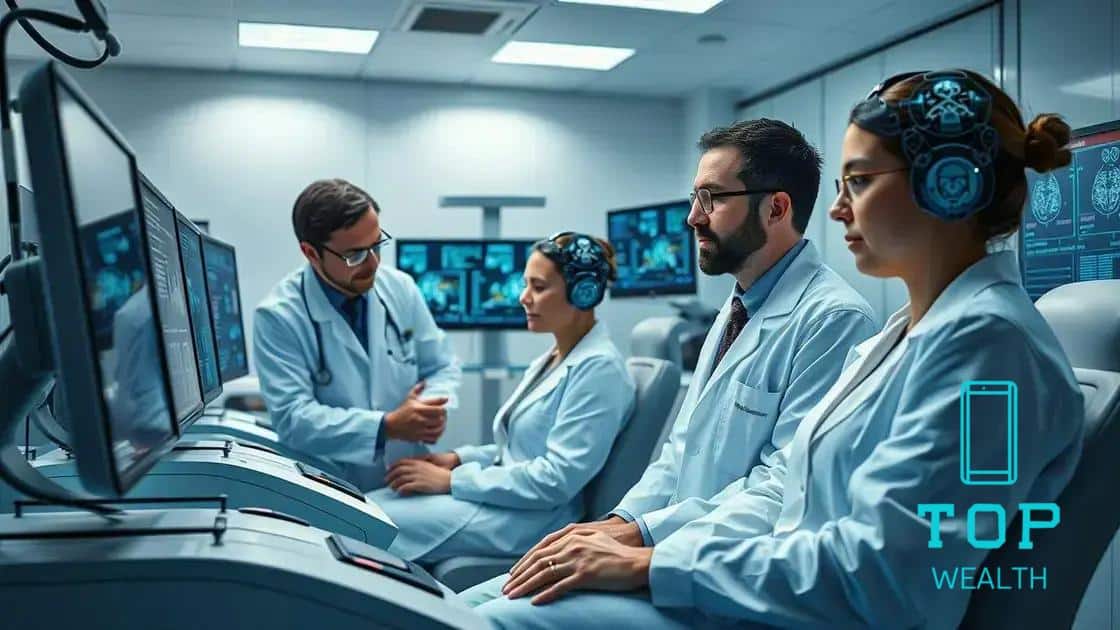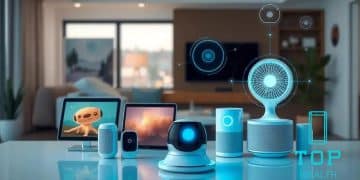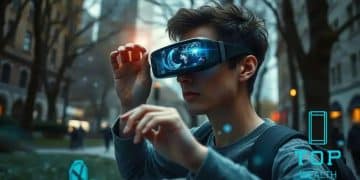Brain-computer link tech advances in clinical trials

Brain-computer link technology enables direct communication between the brain and devices, offering potential benefits in restoring movement, enhancing communication, and assisting in neurological rehabilitation.
Brain-computer link tech advances in clinical trials are paving the way for innovative solutions in patient treatment. Have you ever imagined communicating through thought alone? This technology is revolutionizing healthcare in ways we are just beginning to understand.
Overview of brain-computer link technology
The overview of brain-computer link technology reveals a fascinating intersection of science and innovation. This technology enables direct communication between the brain and an external device, paving the way for numerous applications in healthcare and beyond.
What is Brain-Computer Link Technology?
At its core, brain-computer link technology involves a system that can interpret brain activity and translate it into commands. This is achieved through advanced algorithms and sensors that detect electrical signals produced by neurons. By interpreting these signals, researchers can develop systems that allow individuals to control devices merely by thinking.
Applications of Brain-Computer Links
This technology is poised to transform various fields, particularly in medicine. Some notable applications include:
- Restoring mobility to individuals with paralysis.
- Enabling communication for those with speech impairments.
- Enhancing cognitive functions.
- Providing therapeutic options for neurological disorders.
As we delve deeper into the capabilities of brain-computer link technology, we discover its potential to change lives. By improving the way we interact with devices, it opens doors to new treatment options for various disabilities.
Challenges and Considerations
Despite its promise, several hurdles remain in the development of this technology. Issues such as signal accuracy, device safety, and ethical considerations are paramount. Addressing these challenges is critical for broader acceptance and application.
Ongoing research aims to create more sophisticated systems that can better interpret brain signals. By enhancing the reliability of these systems, we can improve the quality of life for many individuals.
In summary, the overview of brain-computer link technology highlights its incredible potential. As we harness the power of our brains, the future looks bright for innovations that can significantly enhance human capabilities.
Recent clinical trial results and implications

Recent studies on brain-computer link technology have yielded exciting results. These clinical trials are essential in understanding how this technology can transform patient care and enhance recovery.
Key Findings from Recent Trials
One major breakthrough is the ability to control robotic limbs directly through thought. Participants in trials have demonstrated impressive control, showcasing how brain-computer interfaces can restore movement for individuals with disabilities.
Significant Improvements in Health Outcomes
Another noteworthy result is the improvement in communication for patients with neurological disorders. These trials indicate that users can effectively convey their thoughts, leading to better engagement with healthcare providers.
- Enhanced patient mobility through neural control.
- Improved speech capabilities for patients with speech impediments.
- Greater autonomy and independence for individuals post-injury.
Ongoing research shows promising use in treating conditions like ALS and stroke rehabilitation. These findings highlight how brain-computer link technology is not just theoretical; its applications are becoming tangible and meaningful.
Long-Term Implications for Healthcare
The implications of these trials extend beyond immediate patient care. They open pathways for further research and innovations. As we recognize the potential of brain-computer link technology, the medical community must consider how to integrate these findings into standard practices.
Furthermore, this technology could lead to the development of personalized treatment plans tailored to the specific needs of patients. With continued advancements, we may witness significant changes in rehabilitation processes and overall patient quality of life.
Potential applications in medicine
The potential applications in medicine for brain-computer link technology are vast and groundbreaking. This technology is already showing promise in various healthcare areas, transforming how we approach treatment and rehabilitation.
Restoring Movement
One of the most significant applications is in restoring movement for patients with paralysis. By using brain-computer interfaces, individuals can control robotic limbs or wheelchairs directly through their thoughts. This ability not only aids in mobility but also boosts the psychological well-being of patients.
Enhancing Communication
Additionally, brain-computer links can help individuals with speech impairments communicate more effectively. These systems can translate brain signals into speech or text, providing a voice to those who may have lost the ability to speak.
- Assistive devices for disabled individuals.
- Custom communication solutions for patients with ALS.
- Potential for rehabilitation tools in speech therapy.
Furthermore, this technology has implications in neurorehabilitation. Patients recovering from strokes or brain injuries can use brain-computer interfaces to regain motor skills. Through targeted exercises, these systems can facilitate brain recovery and enhance physical therapy.
Psychiatric Treatment
Innovative uses of brain-computer link technology also extend to psychiatric treatment. By analyzing brain signals, clinicians can gain insights into mental health disorders. This data can guide personalized treatment plans, providing tailored therapies for conditions such as depression and anxiety.
The future of brain-computer link technology in medicine is bright. As research progresses, we can expect to see even more applications that will change the landscape of healthcare. This technology holds the potential to significantly improve quality of life and empower patients in their recovery journeys.
Challenges faced by brain-computer technologies

Brain-computer technologies present exciting opportunities, but they also face several challenges. Understanding these obstacles is crucial for advancing this innovative field.
Technical Limitations
One significant challenge is the technical limitations of current brain-computer interfaces. For instance, accurately interpreting brain signals can be complex. The technology needs to distinguish between various signals, and any error can lead to ineffective outcomes. Improvements in sensor technology and algorithms are vital for enhancing signal clarity.
User Safety and Comfort
Another major concern is the safety and comfort of users. Many interfaces require invasive methods, such as implants, which carry risks. Even non-invasive devices can cause discomfort over extended use. Thus, ensuring user comfort while maintaining effectiveness is a critical hurdle.
- Addressing potential health risks related to implants.
- Minimizing discomfort from external devices.
- Ensuring long-term usability without adverse effects.
Moreover, there are ethical considerations that must be addressed as the technology evolves. Issues like privacy, consent, and mental autonomy are paramount. Knowing how to handle data obtained from users’ brain activity is essential for maintaining trust.
Funding and Access
Funding is another challenge, as research and development in this field can be costly. Many promising projects struggle to secure the necessary investment. Additionally, access to advanced brain-computer technologies may be limited in certain regions, leading to disparities in who benefits from these innovations.
Despite these challenges, researchers are optimistic about the future. Continued collaboration within the scientific community and advancements in technology should help overcome these obstacles. As solutions develop, we can expect brain-computer technologies to grow, ultimately benefitting a wider range of patients.
Future directions in brain-computer link advancements
The future directions in brain-computer link advancements offer thrilling possibilities for technology and medicine. Innovations are emerging that will refine how we connect the brain with devices, aiming to enhance both functionality and user experience.
Improving Accuracy and Speed
One significant focus is on improving the accuracy and speed of signal interpretation. Researchers are developing sophisticated algorithms that can faster and more accurately translate brain signals into meaningful commands. This advancement will enhance the user experience, allowing for seamless control of devices.
Wearable Technologies
Furthermore, the push towards wearable technologies is promising. Future devices may not require invasive methods, making brain-computer interfaces more accessible. Lightweight and comfortable wearables could become mainstream, enabling broader adoption for various applications.
- Advancements in neural signal detection.
- Integration with daily-use devices like smartphones.
- Development of non-invasive brain-computer interfaces.
Collaboration between different fields is vital for these advancements. By combining insights from neuroscience, engineering, and software development, researchers can create innovative solutions that can positively impact individuals’ lives.
Expanding Applications in Healthcare
Future advancements will likely lead to more diverse applications in healthcare. Beyond mobility and communication, brain-computer links could assist in mental health treatment and rehabilitation for various neurological disorders. Such expanded uses will create new therapeutic options, making personalized medicine a reality.
The incorporation of artificial intelligence will also play a crucial role in this evolution. AI can analyze data from brain-computer interfaces, providing insights into brain activity that were previously unattainable. This capability can enhance our understanding of mental health and cognitive functions.
As the field progresses, awareness of ethical considerations will remain essential. Balancing innovation with privacy, consent, and safety will be crucial in garnering public trust and ensuring sustainable development in brain-computer technology.
FAQ – Frequently Asked Questions about Brain-Computer Link Technology
What is brain-computer link technology?
Brain-computer link technology allows direct communication between the brain and external devices, enabling control of those devices through thought.
What are the potential benefits of this technology?
The technology can restore movement for paralyzed individuals, enhance communication for those with speech impairments, and assist in rehabilitation for neurological conditions.
What challenges does brain-computer technology face?
Challenges include technical limitations, user safety, ethical considerations, and securing sufficient funding for research and development.
What does the future hold for brain-computer technologies?
The future includes improved accuracy, non-invasive devices, broader applications in healthcare, and ethical practices guiding its development.





